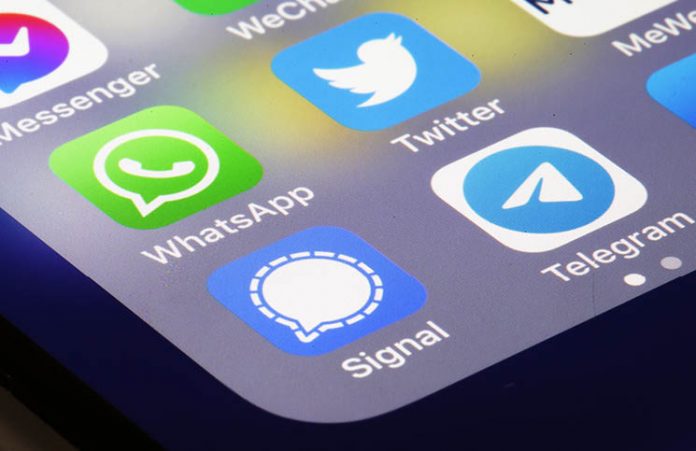
If your choice of encrypted messaging app is a toss-up between Signal, WhatsApp and Telegram, do not waste your time with anything but Signal. This isn’t about which has cuter features, more bells and whistles, or is most convenient to use – this is about pure privacy. If that’s what you’re after, nothing beats Signal. WhatsApp recently sparked much debate on 6 January 2021, when they announced change in their terms of service. Informing users that it will share data with Facebook and third parties effective 8 February 2021. Users were told to either agree or discontinue using the platform. Since WhatsApp has decided to delay updating its privacy policy to May 15, 2021 following mass confusion over what data it shares with its parent company, Facebook.
Now if Elon Musk’s tweet: “Use Signal” has you looking for a new messenger, here are the key privacy differences in the biggest players right now.
Signal – Does not collect data, only your phone number. It’s Free and no ads. Funded by nonprofit Signal Foundation. Signal is fully open-source. The encryption: Signal Protocol.
Signal is a typical one-tap install app that can be found in your normal marketplaces like Google’s Play Store and Apple’s App Store and works just like the usual text-messaging app. It’s an open-source development provided free of charge by the nonprofit Signal Foundation and has been famously used for years by high-profile privacy icons like Edward Snowden.
WhatsApp – Data is linked to you: Read about in-depth analysis below. It’s Free with ads and premium versions are available. Funded by Facebook. WhatsApp is not open-source, except for encryption. The encryption: Signal Protocol.
There’s a difference between security and privacy. Security is about safeguarding your data against unauthorized access, and privacy is about safeguarding your identity regardless of who has access to that data. On the security front, WhatsApp’s encryption is the same as Signal’s, and that encryption is secure. But that encryption protocol is one of the few open-source parts of WhatsApp, so we’re being asked to trust WhatsApp more than we are Signal. WhatsApp’s actual app and other infrastructure have also faced hacks, just as Telegram has.
Jeff Bezos’ phone was famously hacked in January of 2020 through a WhatsApp video message. In December of the same year, Texas’ attorney general alleged – though has not proven – that Facebook and Google struck a back-room deal to reveal WhatsApp message content. A spyware vendor targeted a WhatsApp vulnerability with its software to hack 1,400 devices, resulting in a lawsuit from Facebook. WhatsApp’s unencrypted cloud-based backup feature has long been considered a security risk by privacy experts and was one way the FBI got evidence on notorious political fixer Paul Manafort. To top it off, WhatsApp has also become known as a haven for scam artists and malware purveyors over the years.
Telegram – Data linked to you: Name, phone number, contacts, user ID. It’s Free with forthcoming Ad Platform and premium features. Telegram is funded mainly by founder Pavel Durov. Telegram is only partially open-source, The encryption: MTProto.
Telegram falls somewhere in the middle of the privacy scale, and it stands apart from other messenger apps because of its efforts to create a social network-style environment. While it doesn’t collect as much data as WhatsApp, it also doesn’t offer encrypted group calls like WhatsApp, nor as much user data privacy and company transparency as Signal. Data collected by Telegram that could be linked to you includes your name, phone number, contact list and user ID.
Telegram also collects your IP address, something else Signal doesn’t do. And unlike Signal and WhatsApp, Telegram’s one-to-one messages aren’t encrypted by default. Rather, you have to turn them on in the app’s settings. Telegram group messages also aren’t encrypted. Researchers found that while some of Telegram’s MTProto encryption scheme was open-source, some portions were not, so it’s not completely clear what happens to your texts once they’re in Telegram’s servers.
Telegram has seen several breaches. Some 42 million Telegram user IDs and phone numbers were exposed in March of 2020, thought to be the work of Iranian government officials. It would be the second massive breach linked to Iran, after 15 million Iranian users were exposed in 2016. Most recently, its GPS-enabled feature allowing you to find others near you has created obvious problems for privacy.
Is WhatsApp more convenient than Signal and Telegram? Yes. Is it prettier? Sure. Is it just as secure? We won’t know unless more of its source code is revealed. But is it more private? Not when it comes to how much data it collects comparatively. For real privacy, Signal is the best option.
Article Source: cnet

